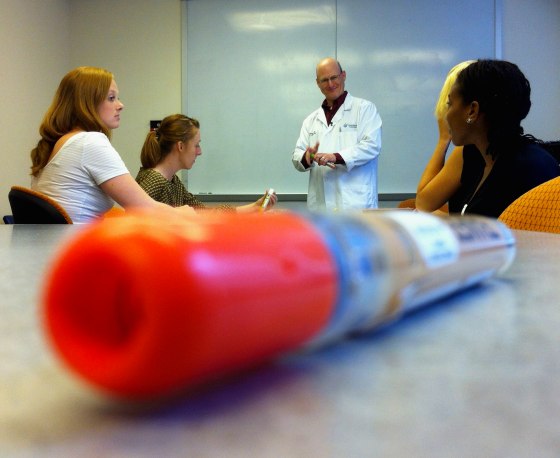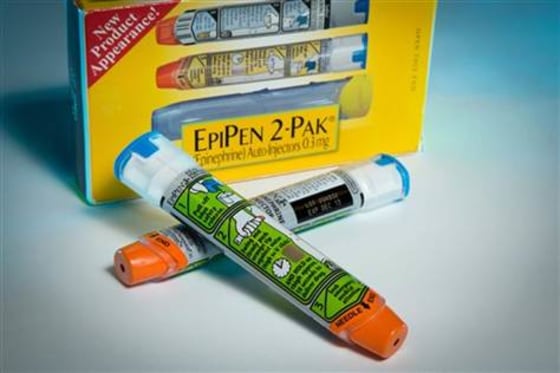New EpiPen law could save lives of schoolkids with severe allergies
Nov. 13, 2013 at 4:33 PM ET

Nationwide Children’s Hospital
Daniel Scherzer, an emergency medicine physician at Nationwide Children’s Hospital, explains proper EpiPen use to a group of students.
Liam had been diagnosed with certain food allergies, but had drunk soy milk about 200 times with no problems, Denny said.
But on this particular morning, he started coughing and vomiting, and within a minute, he was unconscious.
Luckily, Denny, a pediatrician who works in the emergency room of Nationwide Children's Hospital in Columbus, Ohio, had an injectable form of the drug epinephrine. Denny's husband administered the drug and they rushed Liam to the emergency room, by which time her son had recovered fully.
"If we had not had the auto-injector at home, I do not think he would have survived," Denny told LiveScience.
Now, a new law will make it easier for children like Liam to receive life-saving injections of epinephrine (also called adrenaline) at school, even if they don't have a prescription for the drug.
The law, which President Barack Obama signed Wednesday, provides financial incentives for states to pass laws allowing schools to stock epinephrine and treat children who do not have a prescription for the drug. States with such laws on the books will now be eligible for grants to stock their schools with EpiPens or other forms of injectable epinephrine, Denny said.
The children most likely to benefit from the law are those who aren't known to have an allergy who suddenly go into anaphylaxis, a potentially deadly immune reaction to food, insect bites or other allergens. Anaphylaxis causes the airways to narrow, blood pressure to plummet and can lead to rapid unconsciousness and death.

David Ake / AP photo
Examples of epinephrine pens that the Center for Disease Control and Prevention guidelines recommend that schools stock to combat food allergies.
"The scary thing about anaphylaxis is it's really unpredictable. We have no idea when kids are going to react to a food allergy," Denny said.
Nationally, the incidence of food allergies is on the rise, with incidence of peanut allergy more than tripling between 1997 and 2008, according to a 2010 study in the Journal of Allergy and Clinical Immunology. The latest research suggests one in 13 children have a food allergy, Denny said.
Yet many schools still don't stock epinephrine. Currently, only 27 states have laws on the books that allow schools to administer the drug to children without a prescription, Denny said.
Even with more schools stocking epinephrine injections, children who know they have allergies should still carry the medicine with them, Denny said.
Follow Tia Ghose
Copyright 2013 LiveScience, a TechMediaNetwork company. All rights reserved. This material may not be published, broadcast, rewritten or redistributed.

No comments:
Post a Comment